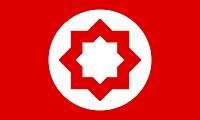Islamic Nations Party
| Islamic Nations Party | |
|---|---|
| Participant in Iranian Revolution | |
|
| |
| Active |
late 1950s[1]–late 1960s[2] Main phase: 1963–1965[1] |
| Ideology | |
| Leaders | Kazem Mousavi-Bojnourdi (POW) |
| Headquarters | Tehran, Iran |
| Strength | ~200[1] |
| Originated as | Fada'iyan-e Islam[5][6] |
| Became |
|
| Allies | |
| Opponents |
|
Islamic Nations Party or Party of Islamic Nations (Persian: حزب ملل اسلامی, translit. Ḥezb-e melal-e eslāmi) was an Islamic leftist armed group with clandestine system[9] short-lived during 1960s. It was initially a secret society active against Pahlavi dynasty in late 1950s.[1] It consisted of middle-class youth, mostly highschool teachers and university students.[1]
The organization was reportedly involved in 1963 events and 1965 assassination of Hassan Ali Mansur.[5][6] However, it is alleged that oppening fire on Police before arrest of leading members was its "sole standoff".[1]
After a visit to Iraq, leader Mousavi-Bojnourdi brought two firearms for the planned bank robbery and kidnapping. A rank-and-file member was arrested accidentally and led security forces to a 140-men list of the members.[1] A cache of arms belonging to the party was also discovered in the hills of north Tehran.[6]
55 members of the group were arrested in 1965[1] and received long-term confinements in 1966 by military tribunal. Four members were executed[6] and death sentence of the leader Mousavi-Bojnourdi reduced to life in prison.[1]
A number of Revolutionary Guards commanders including Javad Mansouri, Abbas Zamani and Abbas Duzduzani were members of the group.[8]
References
- 1 2 3 4 5 6 7 8 9 10 11 12 Vahabzadeh, Peyman (2010). "Islamic Nations Party". Guerrilla Odyssey: Modernization, Secularism, Democracy, and the Fadai Period of National Liberation In Iran, 1971-1979. Syracuse University Press. p. 9–10. ISBN 9780815651475.
- ↑ Taheri, Amir (1986). The Spirit of Allah: Khomeini and the Islamic revolution. Adler & Adler. p. 187. ISBN 9780917561047.
- 1 2 Torāb Ḥaqšenās (April 5, 2012) [December 15, 2007]. "ISLAM IN IRAN xiii. ISLAMIC POLITICAL MOVEMENTS IN 20TH CENTURY IRAN". In Ashraf, Ahmad. Encyclopædia Iranica. Fasc. 2. XIV. New York City: Bibliotheca Persica Press. pp. 157–172. Retrieved March 15, 2016.
- 1 2 Bashiriyeh, Hossein. The State and Revolution in Iran (RLE Iran D). Taylor & Francis. pp. 13–14. ISBN 9781136820892.
- 1 2 Mehrzad Boroujerdi (1996). Iranian Intellectuals and the West: The Tormented Triumph of Nativism. Syracuse University Press. pp. 83–84. ISBN 978-0-8156-0433-4.
- 1 2 3 4 5 Said Amir Arjomand (1984). From Nationalism to Revolutionary Islam. SUNY Press. p. 167. ISBN 9780873958707.
- ↑ Torāb Ḥaqšenās (October 27, 2011) [December 15, 1992]. "COMMUNISM iii. In Persia after 1953". In Yarshater, Ehsan. Encyclopædia Iranica. Fasc. 1. VI. New York City: Bibliotheca Persica Press. pp. 105–112. Retrieved March 15, 2016.
- 1 2 Steven O'Hern (2012). Iran's Revolutionary Guard: The Threat That Grows While America Sleeps. Potomac Books, Inc. pp. 18, 22–23. ISBN 1597977012.
- ↑ Marvin Zonis (2015). Political Elite of Iran. Princeton University Press. p. 115. ISBN 9781400868803.
